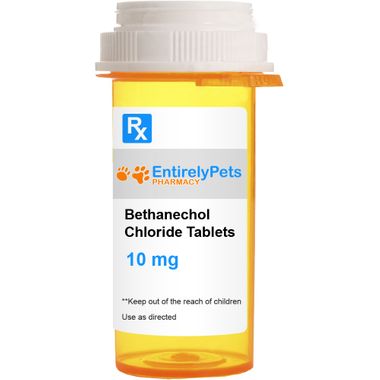SAVE 15% OFF 15% OFF Use Code EPX15 *

Bethanechol Chloride for Pets - 10mg (per tab) (Manufacturer may vary) - [Bladder Support]
- Description
- Directions
- FAQ
- Reviews
Description
Bethanechol is a medication commonly used to increase bladder contractility in order to help the bladder empty and to increase urination. It can also be used to treat symptoms of dysautonomia. Dysautonomia is a condition where the autonomic nervous system, or ANS, does not function properly. The ANS controls unconscious functions of the body such as the gastrointestinal system, cardiovascular system, and metabolic system.
Key Benefits
- Bethanechol is a used to increase bladder contractility in order to help the bladder empty and to increase urination..
- It can also be used to treat symptoms of dysautonomia. Dysautonomia is a condition where the autonomic nervous system, or ANS, does not function properly. The ANS controls unconscious functions of the body such as the gastrointestinal system, cardiovascular system, and metabolic system.
How It Works
Bethanechol works by stimulating the bladder muscles that are responsible for causing urination.
Indications
Bethanechol Chloride Tablets USP are indicated for the treatment of acute postoperative and postpartum nonobstructive (functional) urinary retention and for neurogenic atony of the urinary bladder with retention.
Directions
Use as directed by your veterinarian, and follow all instructions printed on the prescription label. Complete the entire prescription unless instructed otherwise by your veterinarian. Dosage and duration of treatment depend on the condition being treated and response to the medication.
Because bethanechol is considered a cholinergic agent, it is associated with side effects similar to other cholinergic medications. These include the following side effects:
- Increased salivation
- Increased lacrimation or tear production
- Increased urination
- Increased defecation
- When given to smaller animals, bethanechol has mild adverse effects which may also include anorexia (loss of appetite) or vomiting.
It is possible to give your pet too much bethanechol. It is important to give bethanechol exactly as your pet's veterinarian has instructed. Overdosage signs are similar to the side effects but can be more severe in nature. Talk to your pet's veterinarian immediately regarding any potential adverse effects.
Important tips regarding administration and monitoring:
- Give the medication to your pet on an empty stomach unless otherwise instructed by your pet's veterinarian
- Contact your pet's veterinarian if salivation, vomiting, diarrhea, or anorexia are extreme or persist when giving bethanechol
- Monitor your pet for urination frequency and amount voided
It is important to give your pet this medication exactly as prescribed and to not discontinue the drug without consulting with the veterinarian. If you miss giving your pet the dose, give it to him as soon as you remember. If it is close to the next dose, skip the missed dose and continue on your normal schedule. If you are unsure about when to give a missed dose, contact your pet's veterinarian.
Cautions:
Keep out of the reach of children and pets. Do not use on animals with urinary obstructions, recent bladder or intestinal surgery, or a weakened bladder wall. Avoid use in animals with an overactive thyroid gland, gastrointestinal ulcers, inflammatory intestinal disorders, or gastrointestinal obstructions. Use caution in animals with epilepsy, asthma, or low blood pressure. Bethanechol may interact with some other medications. Therefore, inform your veterinarian of any and all medications your pet may be taking. This is especially important if your pet is currently taking epinephrine, atropine, or procainamide. If you notice any behavioral or physiological changes in your pet while administering this medication, contact your veterinarian immediately.
Storage:
Store at room temperature away from moisture and heat. Keep this medication away from children and pets.


